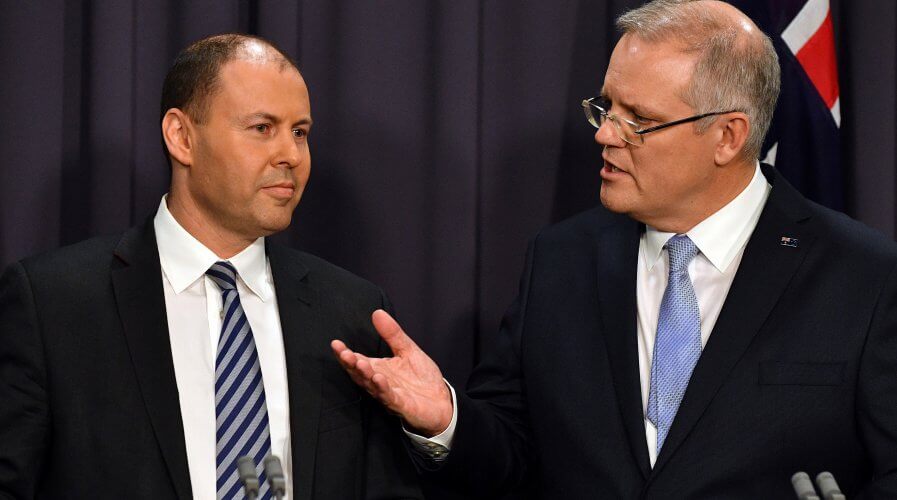
What do Australian’s want from their Prime Minister Scott Morrison (R) and treasurer Josh Frydenberg (L) from the budget this year? Source: Saeed KHAN / AFP
How the Federal Budget can help tech innovation in Australia
AUSTRALIA is often seen as a competitor to Singapore, but it’s also a strong competitor to the USA and the UK in many ways.
However, over the past few years, economists and financial analysts have pointed out that although the country is keen on digitally transforming itself and its businesses, it doesn’t provide the support needed for that change.
Brisbane, for example, was one of the world’s first cities to appoint a Chief Digital Officer.
The country also runs several initiatives to empower small and medium businesses and hopes to help them upgrade their cybersecurity, payments, and other business processes and infrastructures.
Given the vast number of cybersecurity threats local businesses in Australia face every day, the Australian Cyber Security Center was established and a strong information security manual was recently put together.
However, there’s still plenty of room for improvement; a lot more needs to be done by the government to support innovation in the country.
Tech businesses and investors in Australia are hoping that the new Federal Budget will provide many incentives and motivations to businesses, industry partners, and government agencies to transform their operations and fund and adopt new innovations.
Speaking to Tech Wire Asia ahead of the 2019 Federal Budget, Pottinger Co-Founder and Executive Chair Nigel Lake said that the key in Australia is to promote the tech/investment ecosystem.
“There are several elements to this. First, Australia needs fiscal initiatives to accelerate investments such as the ability to write off costs at an earlier stage (similar to US tax structures).”
Next, Lake said emphasized that the government needs to serve the customer as well, and set aside a small part of its procurement budgets to adopt new technologies.
“Governments should set aside at least one percent of relevant budgets (such as technology spend) and dedicate this to trialing new products and services. This addresses one of the most critical barriers to success for B2B tech companies in particular, which is securing early paying customers.”
Lake explains that a minute bias towards helping new and innovative B2B technology companies in Australia will help significantly boost their ability to raise capital and fuel the next round of innovation, promoting a tech-focused innovation ecosystem in the country.
“When a B2B tech company wins a AUD 1 million (US$710,000) government contract, it’s valuation increases 10-fold, allowing it to raise more money. This just means the government can help grow the tech-ecosystem in the country without really allocating any money specifically towards that cause.”
While Lake doesn’t advocate the need to support Australian technologies per se, he feels there must be an emphasis on support for companies that have an operational base in Australia and who thus create jobs in the country.
Deloitte Partner John O’Mahony told Tech Wire Asia that this year, they expect the government to focus on ensuring the availability of digital skills for local businesses.
“Boosting digital skills is the number 1 priority. We forecast demand for tech workers will grow by almost 100,000 by 2023, and not enough people are graduating with the right qualifications to fill this,” said O’Mahony.
Lake believes that problem can be solved at least in the short term, by bringing back the 457-category visa program.
The replacement 482-category visa program is complicated and time-consuming. As a result, it is harder for companies to recruit the foreign talent they need to support immediate business needs.
“The 457-category visa was in existence for a long time and it allowed easy recruitment of skilled workers to foster development. Tech and non-tech companies really appreciated this program. Getting back the original 457-category visa will help the tech ecosystem in the country flourish,” explained Lake.
“Most of the changes needed to support technology will cost the government very, very little. It’s much more about mindset and focus,” concluded Lake.
The Federal Budget, to be announced later today, is expected to make a return to surplus for the first time in a decade. Economists and analysts believe that the government will do well if the provisions of the budget are focused on preparing the country and economy for a better, more digitally-equipped future.
READ MORE
- The criticality of endpoint management in cybersecurity and operations
- Ethical AI: The renewed importance of safeguarding data and customer privacy in Generative AI applications
- How Japan balances AI-driven opportunities with cybersecurity needs
- Deploying SASE: Benchmarking your approach
- Insurance everywhere all at once: the digital transformation of the APAC insurance industry






